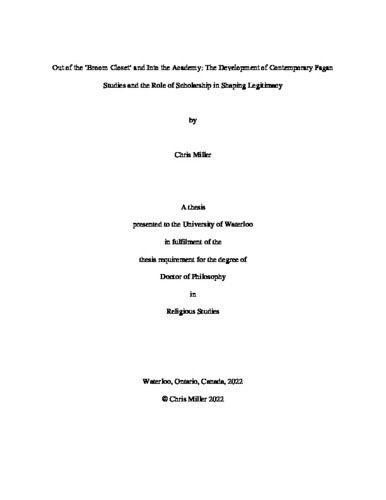| dc.description.abstract | Contemporary Pagan studies is an academic field that explores the beliefs, behaviours, practices, and identities of contemporary Pagans, borrowing lenses from such fields as religious studies, anthropology, sociology, history, archaeology, and folklore studies. This field emerged within the last roughly forty years, and contains perhaps one hundred scholars worldwide who direct their focus towards this religious community. Two fundamental lines of inquiry guide this critical historical analysis of the field: how do academic fields develop, and how do fields interact with the communities that they study?
Concerning the first cluster of questions – how fields develop – this dissertation explores how fields progress from a few scholars discussing their shared interests informally at a larger conference to having established hubs for sharing and presenting research, including conferences, peer-reviewed journals, university courses, and academic publications. This project documents the spaces where Pagan studies exists, traces how these hubs develop, and explores the pitfalls that scholars often experience during processes of institutionalization.
Concerning the second cluster of questions – how fields interact with communities – this dissertation explores how Pagan studies interacts with Pagans themselves. Engagement assumes various forms, from practitioners who read publications, informants who interact with scholars in the field, students taking an introductory course, and researchers who are Pagans themselves. I argue that through these different interactions, scholars legitimize those subjects about which they write. Legitimation – which can also be understood as validating or authorizing a particular perspective – can occur both implicitly and explicitly. Scholars discursively legitimize communities through the labels that they apply, by positioning the community in a certain (generally favourable) way, or asserting that particular characteristics are essential to all Pagans. More explicitly, scholars legitimize communities when they speak on behalf of Pagans before media, public institutions, or in legal proceedings. This dissertation explores how scholars perform this legitimizing work, and the debates that occur within and outside this field regarding appropriate relationships between scholarship and advocacy.
Although based on a relatively small academic field (studying a small religious community), this dissertation offers insights into such broader processes as how knowledge systems are constructed and the power of academia to legitimize ideas. | en |

